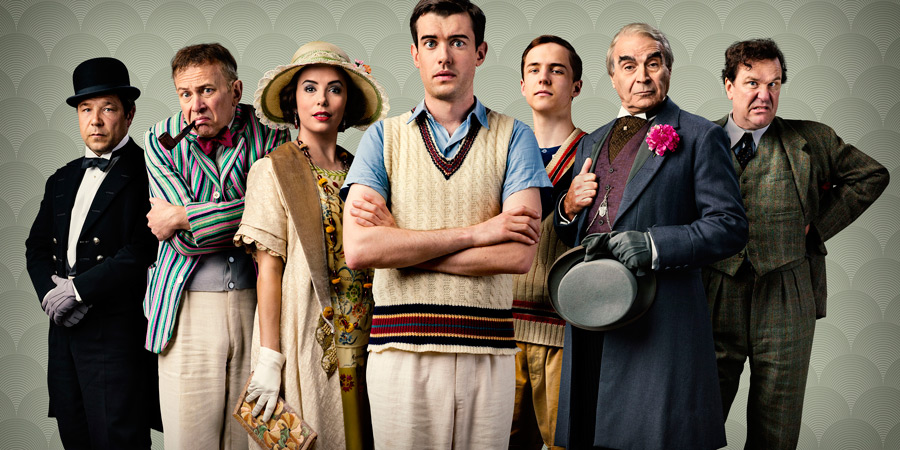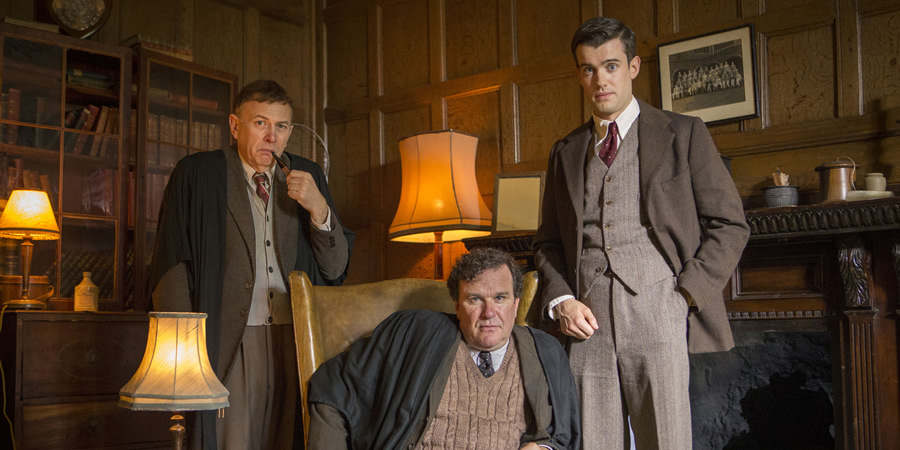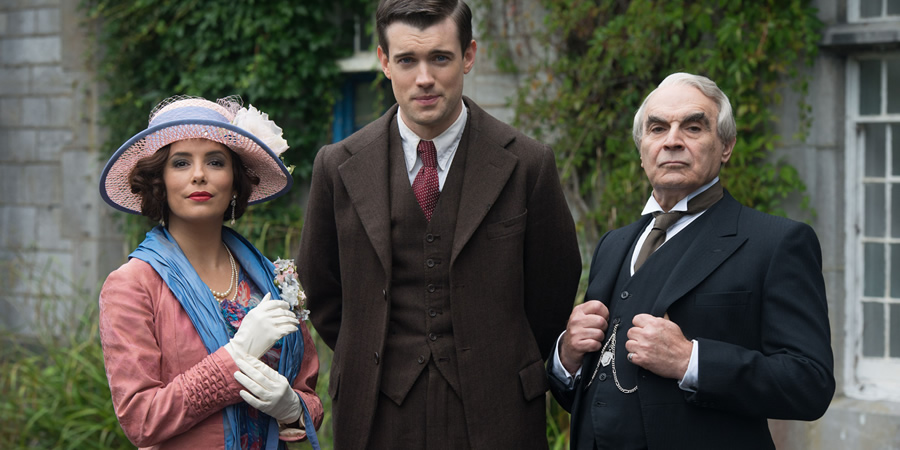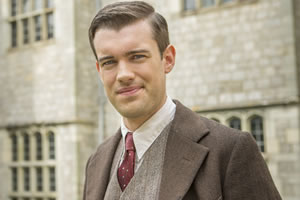James Wood interview

James Wood talks about adapting Evelyn Waugh's book to bring it to screen...
The novel has never been filmed before...
The book has never been adapted for television and that makes it an incredibly exciting proposition. It's a scary thing to do because it's such a loved book. Lots of people think it's the greatest comic novel in English fiction. So that's the challenge - living up to expectations.
Does the book lend itself to adaptation?
We are doing three hour long episodes and the book moves through three different worlds. Paul is the line that pulls you through those three worlds but it's been a huge and very entertaining challenge pulling off what is effectively three one hour films that all still feel like the same show.
The first episode is set in a horrendous minor Welsh public school, populated with lunatics and monsters. The second episode is set in Margot's high society world and Kristian the production designer has built an amazing modernist home that Margot lives in. That world is all parties and decadence and has something of a Noel Coward feel. And the third episode largely takes place in a prison.
Paul Pennyfeather is the thread that pulls us through those worlds but it's been a real challenge, an exciting challenge for everyone, pulling off those three worlds and making it feel like a whole.
So in terms of the period of the story, did you feel it was dated in any way? Did anything need modernisation from your point of view?
One of the things that's so exciting about the book is that all the satirical targets that Evelyn Waugh was attacking in the 1920s are still with us. It starts with some Oxford posh yobs in what's called The Bollinger Club, I think we all know that's The Bullingdon Club. Then the book presents a great number of British establishment monsters; abusive teachers, governors who don't know how to run a prison, mad German architects. 90 years on from the book our world still feels like it's full of these characters.
The establishment Waugh depicts in the book is still running the country now. So in that regard the book feels as sharp and as prevalent as ever and I think that's why so many of us were really excited to be doing the material. It's a period classic that just doesn't feel dated at all.
I also think people will find Evelyn Waugh's wit much more anarchic and acerbic than they perhaps remember or have a perception of. There's some really biting humour in it, there's beheadings, there's atrocious behaviour, so I think all that helps make it feel incredibly contemporary and modern in tone.

In a lot of ways the novel very much feels like it's set in a period of immense change and the social revolution and then you've got the sort of horrors of the First World War. The title itself, the reference to decline of empires. Do you think actually now is a better time than any for that to resonate with the audience?
It's a book that very much came out of the immense tragedy of the First World War, so Paul in the book - and this character occurs a lot in Evelyn Waugh's literature - is a fatherless man. He's lost his father and I've slightly elevated that notion more than it is in the book.
In many ways Paul's story is about a man being seduced by a succession of inappropriate, surrogate father figures. That is a reflection of the fact that for the generation in the late 1920s there were no men around, because they had all died during the war. That's a story that's particular to Paul. But it's also reflective of where the nation was at that point in history.
I've really tried to make sure that idea is sustained through the piece. Paul in our version has a photo of his father that we have used more in the series than is in the book, and in the series Paul talks a lot about how he seeks a sense of permanence in life. That's an idea that is in lots of Evelyn Waugh's early works. And yes I do think the notion of young people seeking some sense permanence in life does resonate very well in our current topsy-turvy post Brexit, Trumpland world.
Famously Paul Pennyfeather a very passive hero. Was that a problem for you? Was it difficult for an adaptation?
He's a classic Evelyn Waugh protagonist in that he's not someone who particularly leads or drives events. He's someone who terrible things happen to and he sort of survives them.
Paul is one of Evelyn Waugh's innocent, sometimes passive, heroes. It's a coming of age story. But in television you need your lead character to be proactive, and so I have invented some action, particularly for Episode 2 where Otto, the lunatic German architect who Margot has employed, is very much played as a love rival to Paul.
In our version I've got Paul being much more front foot and active in defeating Otto his love rival. Television adaptations need to be unafraid to change things from the book, as long as you do it in the spirit of the book. In the third episode Paul's in prison and in our version he very much wants to escape. That's a story addition I've made to make Paul more active. Paul is plotting desperately to get out of prison in our version so that he can get back to Margot, the woman he loves, before she marries someone else.
Did you feel to appeal to a TV audience you needed to temper the mocking of people?
I feel that Evelyn Waugh is very even handed in his mockery of just about everybody. There's no race or nation who is spared really. And no element of the establishment. Waugh is often accused of racism. I don't think he was necessarily more racist than that generation generally, but obviously those 1920s white patriarchal values are not acceptable now, so there has been a little bit of finessing on that issue.
As long as we are not racist and offensive as programme makers, some of the characters in the show can be. And certainly Paul Pennyfeather our lead isn't racist. But, by and large, if you are writing a comedy drama, to worry about whether you are offending anybody is a really bad place to go. I have been hugely supported in my adaptation by the production company and the BBC. It's been great.
I haven't had any notes reacting against the humour I've taken from the book. That's because it just wouldn't be true to the novel if we skimped around Waugh's cruel mocking humour. And one of the great things about writing appalling characters is actors love playing them. I think it's one of the reasons we've got such an incredible cast. They get to come in and play some truly memorable, monstrous people.
There's a lot of weirdness in the characters of people who aren't doing their jobs. The parents were not parenting. Does that help you in a way as a writer?
The book is full of people who shouldn't be doing the job they are doing. It's full of teachers who should not be teachers. Captain Grimes is the ultimate example of that. Priests who shouldn't be priests. Lucas Docherty is a wonderful character Jason Watkins is playing in Episode 3 who is a prison governor who is completely unfit for the job.

There's inevitable potential accusations of non political correctness. When these are inverted, does that offer you some sort of protection for the adaptation?
You can't worry about that stuff if you're writing a comedy. When we did [BBC Two church-based sitcom] Rev we did stories that tackled subjects that were quite challenging to some people. I think one of the things you want as a writer is that the subject matter and the characters challenge preconceptions or the status quo. Not all comedies do that of course and that's fine, but one of the things we did with Rev was try and investigate issues of faith with a comic tone, and one of the things I love about this show is that because Paul's character moves through so many different aspects of British life and the establishment, it really gets to attack lots of aspects of our world.
I don't worry about whether anyone thinks it is politically correct or not because I think as a comedy writer, if you start worrying about that you've had it.
What would Evelyn Waugh have made of this adaptation?
I hope, and genuinely think, that Evelyn Waugh would have loved this adaptation. Partly because we are surprisingly faithful to the book. I have expanded some bits and given the adaptation more of a television plot motor in places. But we are extraordinarily faithful to large passages of the book.
Sometimes I feel that I have been getting praise for just literally typing out some of the incredible scenes in the book and the great dialogue. I've been very faithful to many scenes and sequences. Faithful to what's literally on the page in many instances but also I think I've been faithful in a wider sense to the spirit of the book. I hope so. One of the nicest things about doing this has been that a lot of the actors and the cast and crew, they've all read the book of course a number of times, have come up to me and said that about the scripts. I'm really pleased about that.
Jack Whitehall has spoken about the pressure on his shoulders portraying a lead character from such a well-loved book. How did you find working with him?
One of the things that I have found most enjoyable about this job is working with Jack Whitehall. He is the most brilliant performer in a variety of senses. I haven't worked with him before and he has just been an absolute joy. Funny and clever and thoughtful. This is a different type of performance from him than people probably know him for doing from Bad Education and Fresh Meat, and I have been absolutely wowed by his thoughtfulness and talent. And he has also been the most brilliant executive as well in terms of thinking about the bigger picture and helping the whole thing come together. Spending time with him has been one of the great pleasures of working on this show.

